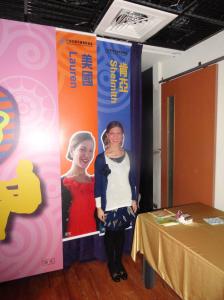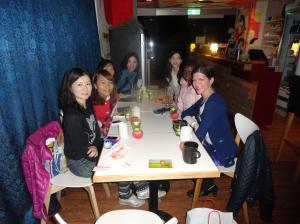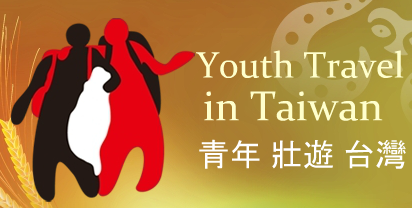The past two days have been a whirlwind.
I had a blast playing Taiwan tourist for five full days, but I was starting to worry that I’d lost sight of the real reason for my trip. I came here through the NYC to play, but also to work . Since I’m passionate about media in many forms, I’m lucky to work in a field that I love. Taiwan’s status as Asia’s most free, crowded media market is what drew me to the island, and since all of my meetings with various outlets were scheduled for mid-week this week, it seemed a long way away. But the last 36 hours have more than made up for the slow start!
Yesterday began at 10 am with rehearsals for the NYC’s Youth Trekkers’ Party. Myself and three other trekkers gave presentations on our trip to a group of students, several of whom came up to us after to ask questions and even offer gifts, including postcards and pictures. I remember how I was going to assemblies at that age and was worried I’d have a tough crowd. But these kids were more than generous, and I (truly) don’t think they were faking it! Since my Chinese is still sorely lacking, I had an interpreter who translated my presentation for me. Calysta, who recently graduated from university and is now job-searching, has studied in Norway and Denmark and told me she’d love to move to London someday. I warned her that Londoners might not be as patient with her as the Taiwanese have been to me-but I think she’s up to the challenge 🙂
Since my itinerary revolves around media, I had several members of the press approach me after my talk to interview me on camera and for print! Haven’t had time to search for them yet, but I was interviewed by media outlets including United Daily News and an online video station. Much as I love interviewing people for a living, it was great to be the interviewee. I loved chatting about my trip so far and sharing my experience in Taiwan! The other ambassadors were interviewed by several of the different media outlets as well, and we spent the hour following the party chatting with another reporter for a special feature on our trips that will be published in December in a Chinese newspaper.
After that interview, I booked it to City Hall, where I headed for the headquarters of Cubie to meet one James Hill. Referred to as “the man” by The Next Web Asia Editor Jon Russell, James works as the International Messenger at Cubie, a 500 Startup that is quickly growing throughout Asia. A native Londoner who moved to Taiwan to teach English, worked for their government, earned his MBA, and is now the face of Taiwanese enterprise, James knows how to make things happen. He hosted a startup drinks party at On Tap last night to introduce me to his contacts over here. His help was much appreciated-not only did I make great contacts including Financial Times correspondents and a swarm of Canadians-the 2 for 1 pasta night, nachos, and pear Rekorderlig with the Red Hot Chili Peppers playing in the background were just what I needed for a touch on home on both sides of the pond 🙂
Maybe that Rekorderlig’s stronger than I thought. Maybe it’s the fact that I continue to run around town on no food or sleep. Regardless, it’s safe to say that today didn’t get off to the best start. Leaving my hostel in plenty of time to make my talk with students in the International Masters Program in International Communications Studies at National Chengchi University (or so I thought), I missed my bus stop when I couldn’t understand the English pronunciation and/or was in too much of a daze to do so. The result? I ended up riding the bus in a loop back onto the freeway, past Taipei 101, and back out past the zoo and-finally-onto NCU. Nice, Lauren.
Thankfully, even being (far too) fashionably late wasn’t enough to deter these students. What was scheduled to be a 30 minute chat with three Masters candidates turned into a 90 minute conversation that included IMICS Chairperson Yu-li Liu and another photo shoot that will accompany an article on my visit to go up on the website! I loved getting the students’ candid ideas about Taiwanese media. Since NCU was originally a KMT school that was moved from mainland China to Taiwan following the war, it’s often assumed that the school continues those ties. Richard, a student who’s worked as a journalist in Scotland and Saudi Arabia, told me, “The media [in Taiwan] is diverse and very creative. It’s Chinese democracy…the chance to study and learn about mainland China from the outside looking in.”
Cathy, who isn’t an NCU student but joined the conversation upon overhearing, has been educated in mainland China and Singapore. She added that her quantitative education in public opinion polls left her yearning for more qualitative analysis, as did an internship with the Communist Central China TV. All four participants-Richard, Cathy, Ruby from Taiwan, and Anna from Russia-agreed that when it comes to critiquing the mainland, Taiwan is far more assertive than neighboring Hong Kong. But they also agreed that the quality of reporting isn’t always there. “There’s not a lot of crime in Taiwan,” Richard explained, “So they need stories to fill air time. They all report things the same way, and there are too many channels.”
Chili Hu agrees. It’s the reason he works with PeoPo-the Taiwanese citizen journalism platform that served as the inspiration for my trip. Chili told me today that when it comes to Taiwanese media, quantity is far from quality. With 23 million citizens and 100 TV channels, Taiwan’s the most competitive TV market in Asia. Reporters Without Borders ranks Taiwan No. 1 in Asia for Freedom of the Press…but Edeman Asia-Pacific ranks Taiwan last in Asia for media credibility, at only 1%. Chili explained that in today’s digital age, grassroots journalism’s easier than ever, and while PeoPo hasn’t existed for long, its mark on Taiwanese journalism has been made.
PeoPo’s name stands for “People Post”—in Chinese dialect, that translates to “A smart way of doing things.” Their citizen journalists all volunteer for PeoPo with regular jobs ranging from teachers to bus drivers on the side. Lest you think it’s hard to entice people to participate, the opposite is true-Chili says they receive multiple applications a day, even years after setting up. All PeoPo applicants must endure ID authentication to become citizen journalists to ensure their credibility. PeoPo never edits its content, but users are required to report stories that they believe are incorrect or inappropriate.
With their reputation preceding them, that has rarely (read: almost never) had to happen. Citizen reporters are held accountable by providing their official authenticity cards to prove their identities, and 89% of reports hold college and/or graduate degrees. 48% are students, allowing them to gain valuable experience producing content for a platform that receives 952, 018 unique visitors to its site per month. So far, 6, 233 citizen journalists have produced 76, 147 news stories total. So while Chili acknowledges that this model wouldn’t work in commercial form because it eschews making money to the point of not even copyrighting material (which means the mainstream media often steals their reports without crediting them), it is nonetheless a breath of fresh air in commercial media with so little credibility that Chili says reporters are “thought of as actors or models.”
After visiting PeoPo, I received a very warm welcome (see above) from Taiwan Indigenous TV! Their Program Department Director, Maraos, showed me around and gave me an overview of their work producing news and lifestyle content related to the 14 indigenous tribes that inhabit Taiwan. Since English was a barrier, and I had no interpreter, the more in-depth conversation I had hoped for didn’t happen on this trip, although Maraos and I agreed to shoot for another one shortly. I told him how admirable it is that TITV exists at all. A year at LSE, where post-colonalism’s the topic du jour, taught how problematic it is that minority groups, especially the indigenous, are given no representation at all, effectively shutting them out of society. The fact that Taiwan’s media market includes channels such as TITV and Hakka TV that address issues impacting these minority populations, speak in their native dialects, and feature talent that looks like them is a major achievement, and the awards that both stations have, as well as PeoPo, are a testament to their quality. And in a population as diverse as Taiwan’s, both historically and today, this high quality programming confirms that the media market’s large size includes something for everyone.
My day ended as I met with Jessie Shih, deputy director of Public Television Service Foundation’s International Department as well as Taiwan Macroview TV. It was a fantastic conversation with far too many off the record quotes. Suffice to say, your takeaways should be that PTS imports fantastic documentaries from all over the world on topics ranging from assisted suicide in Switzerland to the legacy suffered by the children of Hitler’s nazis-a testament to how topics that are taboo almost everywhere find a place in Taiwanese media. PTS is also the largest buyer of BBC material, and they also work closely with WGBH in the US/Boston. Jessie recently returned from London, and upon hearing that my LSE Masters program was only one year, she asked how I managed to go to school and have a life (HA!). She also encouraged me to pursue a position such as hers behind the scenes in order to get more women at the helm of news. But I think your favorite tidbit will be Jessie’s thoughts on Downton Abbey. “I hate it,” she said. “It’s become so soap-y. But I still watch it!”
Don’t lie. You know you do too 🙂
Until tomorrow,
Lauren








